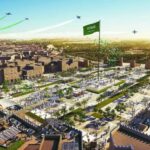
Vision 2030 is an ambitious plan set by the Saudi government to achieve sustainable development and foster innovation. The vision includes a set of goals and initiatives aimed at promoting domestic and foreign investment, and developing non-oil sectors such as tourism, technology, and renewable energy. Through this vision, the Kingdom aims to attract foreign investment, which will contribute to promoting economic growth and job creation
Saudi Arabia stands out as one of the most prominent investment destinations in the Middle East, thanks to its diverse economy, vast natural resources, and strategic location serving as a gateway between continents. With the launch of Vision 2030, the Kingdom aims for a radical transformation of its economy by diversifying income sources and reducing its dependence on oil. This shift opens the door for investors to tap into a range of opportunities that have emerged in various non-oil sectors, supported by government initiatives to simplify procedures and improve the legislative environment.
Vision 2030 represents a bold strategy set by the Saudi government to achieve sustainable development and encourage innovation. It includes a set of goals and initiatives to boost local and foreign investment, while developing sectors like tourism, technology, and renewable energy. Through this vision, the Kingdom intends to attract foreign investors, contributing to economic growth and job creation. Notable projects, such as King Abdullah Financial District and King Salman Energy Park, illustrate Saudi Arabia’s drive to diversify its economy and modernize its infrastructure. For investors, this transformation provides a unique opportunity, especially given the focus on technology and contemporary infrastructure that fosters growth and prosperity for years to come.
Key Sectors and Emerging Opportunities
The Saudi government recognizes the importance of stimulating investment in several major sectors, including oil, gas, renewable energy, manufacturing, healthcare, technology, tourism, and more. As part of its broader diversification strategy, the Kingdom has rolled out incentives for investors, offering tax exemptions, financial facilities, and simplified regulations. This forward-thinking approach underscores the desire to create an ecosystem that supports innovation and sustainable development.
- Energy Sector (Oil, Gas, and Renewables): While Saudi Arabia has long been synonymous with oil, Vision 2030 places a strong emphasis on renewable energy projects, such as solar and wind farms.
- Healthcare Sector: Investors can explore opportunities to build or operate hospitals, clinics, and medical research centers, capitalizing on the growing demand for quality healthcare.
- Technology Sector: From software development and artificial intelligence to financial technology, the Kingdom is fostering a thriving digital environment for start-ups and established tech companies alike.
- Tourism and Entertainment: The government’s push to develop new resorts, theme parks, and cultural festivals signals a significant pivot toward building a global tourist destination.
- Transportation and Logistics: Large-scale investments in ports and airports support the Kingdom’s vision of becoming a major logistics hub connecting Asia, Europe, and Africa.
The Role of Digital Transformation
Saudi Arabia’s digital transformation also plays a vital role in Vision 2030. The focus on digital innovation is evident through projects in AI, blockchain, and the Internet of Things, as well as initiatives like the government’s e-services platforms (e.g., “Etimad” and “Tayseer”) that aim to streamline investment procedures. These technological developments not only enhance efficiency but also present exciting avenues for investors who seek to capitalize on advanced and emerging technologies.
Major Projects and Economic Cities
NEOM is a prime example of the Kingdom’s ambition, blending cutting-edge technology with sustainability to create a futuristic city that offers opportunities in sectors like energy, technology, and tourism. Likewise, King Abdullah Economic City positions itself as a logistics and industrial hub, attracting businesses looking to expand production or international trade routes. Meanwhile, projects like Qiddiya target entertainment and tourism, reflecting the government’s plans to enhance the cultural and leisure landscape.
Strategic Partnerships and Human Capital
Recognizing that economic transformation requires strong human capital, Vision 2030 advocates for investments in education, vocational training, and workforce development. Collaboration with local universities to create research and training programs is another area in which investors can find promising ventures. On the macro level, partnerships with leading international companies help accelerate the transfer of technology and expertise, positioning Saudi Arabia as a competitive, global marketplace.
Why Invest Now
Saudi Arabia’s shift toward an innovation-driven, diversified economy presents a compelling case for timely investment. Improvements in government legislation, streamlined bureaucracy, and financial incentives—coupled with a young, skilled workforce—make the Kingdom’s market both accessible and profitable. Investors can also take advantage of a robust infrastructure that includes advanced transportation networks, well-equipped ports, and smart city projects that highlight technology as a centerpiece for sustainable urban growth.
Conclusion
Investing in Saudi Arabia under the umbrella of Vision 2030 is not merely about seizing immediate commercial benefits; it is about aligning with a long-term, sustainable trajectory that prioritizes modern infrastructure, innovation, and diversified growth. By focusing on emerging sectors, nurturing human capital, and embracing digital transformation, the Kingdom is redefining itself as a global economic powerhouse. For international investors seeking opportunity and growth, Vision 2030 offers a pathway to participate in and contribute to the next phase of Saudi Arabia’s economic evolution. With a strong commitment to reform, investment incentives, and strategic projects, the Kingdom is well-positioned to become a nexus of innovation and long-term prosperity.





No comment yet, add your voice below!